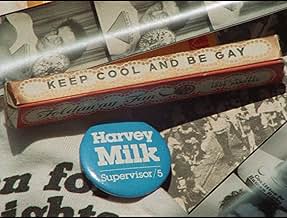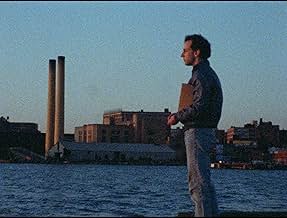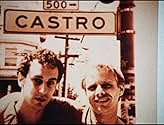The film follows a New York City gay man, in a monogamous relationship, becoming a "buddy" or volunteer bedside companion to another gay man dying of AIDS, and the friendship that develops. ... Read allThe film follows a New York City gay man, in a monogamous relationship, becoming a "buddy" or volunteer bedside companion to another gay man dying of AIDS, and the friendship that develops. Restored in 2020.The film follows a New York City gay man, in a monogamous relationship, becoming a "buddy" or volunteer bedside companion to another gay man dying of AIDS, and the friendship that develops. Restored in 2020.
- Director
- Writer
- All cast & crew
- Production, box office & more at IMDbPro
Featured reviews
As a child of that generation, a peer who survived, I couldn't help but getting very wet cheeks about 10 minutes into the reel. This isn't just a downer/dying film though, it's actually quite uplifting, even erotic and funny for a few seconds. They don't hire actors like these and they don't produce movies like these today. There aren't stories like these today, and that's a very good thing. Still, like other remembrances of the things that brought humanity so far down in the last century, look at this and learn, and remember. Never forget this, the deeply human experience. This isn't a story about a cause or an idea, it's a high-res (before that term existed) depiction of an intimate, loving relationship between two people. This movie is way ahead of it's time,and the current time, early 2016.
The faults to be found with this film are probably all in the technical production value, it was shot in the early 80's and the sound is a little hard to grasp at times. But the cinematography, acting, story and soundtrack are monumental.
The faults to be found with this film are probably all in the technical production value, it was shot in the early 80's and the sound is a little hard to grasp at times. But the cinematography, acting, story and soundtrack are monumental.
I have been vocal before how many in the media and governing political parties spread misinformation and lies about Aids in the early 1980s.
Conservative and religions groups had a vested interest in labelling Aids as a gay only disease. Thousands of hetrosexuals, intravenous drug users, haemophiliacs contracted Aids/HIV because they thought they would be safe. It would not affect them.
Buddies released in 1985 very much as this in the heart of this movie. Gay men with Aids were denied help from government funding. Having to rely on charity.
Robert Willow (Geoff Edholm) is in hospital dying of Aids. His life as gay man was difficult, ostracised from his family when he came out.
David Bennett (David Schachter) is a young gay man in a relationship and with a supportive family. He has volunteered to be a hospital buddy and he is nervous about it.
David and Robert are contrasting personalities. It shows up when they discuss Gay Parades. It is not David's things, he wants to keep his personal life private. Gay activism is not his thing.
Over time they get close and learn to understand each other. This includes David showing an interest in gay politics.
By making David a typesetter who is researching about Aids. It allows writer/director Arthur J Bressan Jr to explore the political implications for Aids. Robert gets angry to learn that Aids is meant to be God's revenge from some anti gay groups.
As in the British television series It's A Sin shown in 2021. Robert dies without his friends being with him. A hospital mix up meant, David could not be contacted.
Buddies was a small scale film made on a very low budget. It only played on the independent film circuit.
Both Edholm and Bressan jr later died of Aids. Because of the the time it was made, it is an important document of that era. Hollywood would later revisit the themes in Longtime Companion in 1989.
Conservative and religions groups had a vested interest in labelling Aids as a gay only disease. Thousands of hetrosexuals, intravenous drug users, haemophiliacs contracted Aids/HIV because they thought they would be safe. It would not affect them.
Buddies released in 1985 very much as this in the heart of this movie. Gay men with Aids were denied help from government funding. Having to rely on charity.
Robert Willow (Geoff Edholm) is in hospital dying of Aids. His life as gay man was difficult, ostracised from his family when he came out.
David Bennett (David Schachter) is a young gay man in a relationship and with a supportive family. He has volunteered to be a hospital buddy and he is nervous about it.
David and Robert are contrasting personalities. It shows up when they discuss Gay Parades. It is not David's things, he wants to keep his personal life private. Gay activism is not his thing.
Over time they get close and learn to understand each other. This includes David showing an interest in gay politics.
By making David a typesetter who is researching about Aids. It allows writer/director Arthur J Bressan Jr to explore the political implications for Aids. Robert gets angry to learn that Aids is meant to be God's revenge from some anti gay groups.
As in the British television series It's A Sin shown in 2021. Robert dies without his friends being with him. A hospital mix up meant, David could not be contacted.
Buddies was a small scale film made on a very low budget. It only played on the independent film circuit.
Both Edholm and Bressan jr later died of Aids. Because of the the time it was made, it is an important document of that era. Hollywood would later revisit the themes in Longtime Companion in 1989.
Buddies (1985) was written and directed by Arthur J. Bressan Jr.
The movie stars Geoff Edholm as Robert Willow, a young gay man dying from HIV/AIDS. David Schachter portrays David Bennett, a young man who volunteers to be a "buddy" to Robert.
The buddy concept was new to me. Humanitarian groups would assign people to visit people dying from HIV/AIDS if they had no other support system. This must have been common, because many gay men had partners who were dying or had died, and people were afraid to go near people with HIV/AIDS because no one knew how it was transmitted.
This film could have been just a sentimental movie about people dying from a dread disease. It was much more than that. It showed us the human face of people dying from HIV/AIDS, and a human face to those brave enough to help them maintain their dignity.
This movie must have been made on a tiny budget, because the two main characters are about the only actors we see. Many people who would normally have appeared on screen were just speaking parts. The sets were essentially just a hospital room and a gymnasium. (David isn't naturally athletic, but he works out so he won't be a "wimp.") Still, it was effective as a two-person film, so the low budget didn't really interfere.
It's hard to say that you "enjoy" a movie like this, but I can say that I learned from it and am glad that I saw it. It was shown at Rochester's great Dryden Theatre at The George Eastman Museum. The movie was presented as "ImageOut of the Archives" by ImageOut, the excellent Rochester LGBT Film Festival. It will work on the small screen.
Buddies has a very strong IMDb rating of 8.2. Yes--it's that good. Find it and watch it.
The movie stars Geoff Edholm as Robert Willow, a young gay man dying from HIV/AIDS. David Schachter portrays David Bennett, a young man who volunteers to be a "buddy" to Robert.
The buddy concept was new to me. Humanitarian groups would assign people to visit people dying from HIV/AIDS if they had no other support system. This must have been common, because many gay men had partners who were dying or had died, and people were afraid to go near people with HIV/AIDS because no one knew how it was transmitted.
This film could have been just a sentimental movie about people dying from a dread disease. It was much more than that. It showed us the human face of people dying from HIV/AIDS, and a human face to those brave enough to help them maintain their dignity.
This movie must have been made on a tiny budget, because the two main characters are about the only actors we see. Many people who would normally have appeared on screen were just speaking parts. The sets were essentially just a hospital room and a gymnasium. (David isn't naturally athletic, but he works out so he won't be a "wimp.") Still, it was effective as a two-person film, so the low budget didn't really interfere.
It's hard to say that you "enjoy" a movie like this, but I can say that I learned from it and am glad that I saw it. It was shown at Rochester's great Dryden Theatre at The George Eastman Museum. The movie was presented as "ImageOut of the Archives" by ImageOut, the excellent Rochester LGBT Film Festival. It will work on the small screen.
Buddies has a very strong IMDb rating of 8.2. Yes--it's that good. Find it and watch it.
Necessarily crude but no less potent for that. In fact, as Koresky points out, its amateurishness only serves to give the film an extremely sensitive quality. One of those movies that feels like a UFO sighting; rarely seen, alien in conception and creation. You sense how open and urgent it feels, which counts for a lot and I was moved by it even in spite of its rudimentary aspects
Buddies (1985)
*** (out of 4)
This ground-breaking drama centers around Robert (Geoff Edholm), a New York City man who is in the hospital dying of AIDS. One day David (David Schachter) comes to visit him as a "Buddy" and the two of them quickly build a friendship, although David knows the story only has one ending.
BUDDIES was one of the very first films to deal with AIDS and homosexuality and it was directed by Arthur J. Bressan Jr. who was actually suffering from the virus while making this picture. In fact, the director would end up dying of AIDS a few years after this film and I think his ghost is hanging all over this picture.
I say his ghost is hanging all over this picture because the film really does come across as a first-hand account of what it was like to have this virus during the 80's and what it was like waiting to die. The film is certainly very depressing and it's rather raw in the way it takes a look at a life cut short and I think it's clear that the director was working out his own demons here.
As I said, the film is exceptionally raw and there are some brutal moments on hand here. As good as this film is, at the same time it's pretty hard to recommend it since the thing is so depressing as I'm sure most people aren't going to want to watch someone slowly dying. The film is about loss, the film is about not wanting to die and it's about regret. It's certainly not a very cheerful movie but at the same time it's so well-made that you can't help but get caught up in its emotions.
Both Edholm and Schachter are good in their roles. I wouldn't say either of them are great as there are a few weak moments in the performances but for the most part they hit all of the right notes and I'd argue that both of them help add tot he rawness of the picture. I thought both of them had a great relationship with each other and as the friendship builds you really do feel it.
BUDDIES isn't the easiest film to sit through but there's no question that it's an important picture and one that deserves more attention than it has gotten over the years.
*** (out of 4)
This ground-breaking drama centers around Robert (Geoff Edholm), a New York City man who is in the hospital dying of AIDS. One day David (David Schachter) comes to visit him as a "Buddy" and the two of them quickly build a friendship, although David knows the story only has one ending.
BUDDIES was one of the very first films to deal with AIDS and homosexuality and it was directed by Arthur J. Bressan Jr. who was actually suffering from the virus while making this picture. In fact, the director would end up dying of AIDS a few years after this film and I think his ghost is hanging all over this picture.
I say his ghost is hanging all over this picture because the film really does come across as a first-hand account of what it was like to have this virus during the 80's and what it was like waiting to die. The film is certainly very depressing and it's rather raw in the way it takes a look at a life cut short and I think it's clear that the director was working out his own demons here.
As I said, the film is exceptionally raw and there are some brutal moments on hand here. As good as this film is, at the same time it's pretty hard to recommend it since the thing is so depressing as I'm sure most people aren't going to want to watch someone slowly dying. The film is about loss, the film is about not wanting to die and it's about regret. It's certainly not a very cheerful movie but at the same time it's so well-made that you can't help but get caught up in its emotions.
Both Edholm and Schachter are good in their roles. I wouldn't say either of them are great as there are a few weak moments in the performances but for the most part they hit all of the right notes and I'd argue that both of them help add tot he rawness of the picture. I thought both of them had a great relationship with each other and as the friendship builds you really do feel it.
BUDDIES isn't the easiest film to sit through but there's no question that it's an important picture and one that deserves more attention than it has gotten over the years.
Did you know
- TriviaLead actor Geoff Edholm died of AIDS in 1989, while second lead David Schachter is still living as of 2020.
- Crazy creditsAll names, persons, places, and locations are fictitious, though based on the current AIDS tragedy, and any similarity to the real thing is by artistic synchronicity.
- ConnectionsFeatures Passing Strangers (1974)
- How long is Buddies?Powered by Alexa
Details
- Release date
- Country of origin
- Official site
- Language
- Also known as
- Друзья
- Filming locations
- Manhattan, New York City, New York, USA(almost entire movie)
- Production company
- See more company credits at IMDbPro
Box office
- Budget
- $27,000 (estimated)
Contribute to this page
Suggest an edit or add missing content





















